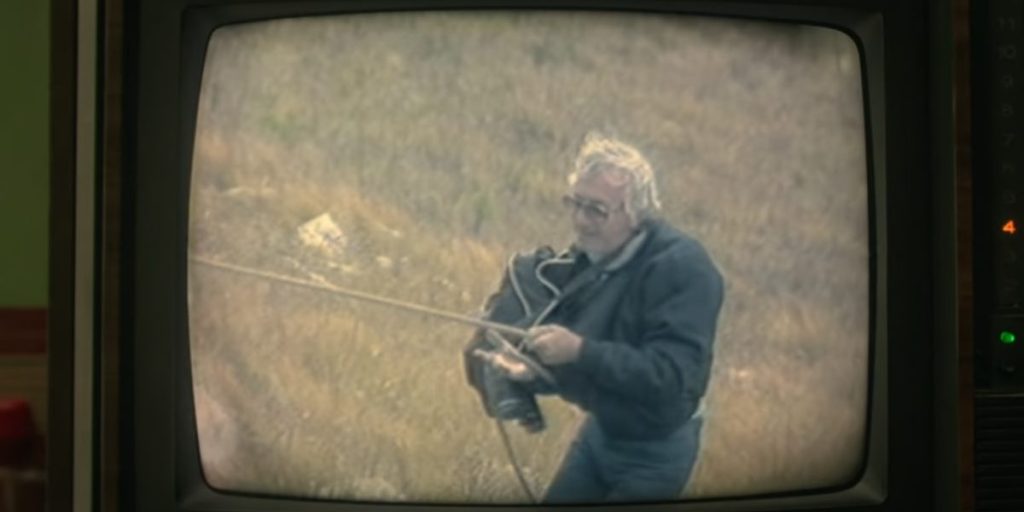The Argentine comedy ‘The Man Who Loved UFOs’ tells the story of entertainment journalist José de Zer in the 1980s. After hearing reports of a UFO sighting in La Candelaria, José embarks on a trip with his cameraman, Chango, to find the truth behind the paranormal claims. However, when paltry field evidence surfaces, the protagonist devises a different method to turn the story into a media sensation.
Directed by Diego Lerman, the Netflix film plots a whimsical tale brimming with nostalgia and amusement centered on making aliens believable to the watching public and one man’s efforts to fabricate his own version of events. As the attention grows on the subject matter, the lines between reality and fiction are blurred in a complex drama about personal conceit and the power of belief.
The Man Who Loved UFOs is a Vague Retelling of a Real Journalist’s Story
Originally titled ‘El Hombre Que Amaba Los Platos Voladores’ in Spanish, ‘The Man Who Loved UFOs’ is loosely inspired by the exploits of a real Argentine journalist, José de Zer. Written by Diego Lerman and Adrián Biniez, the film taps into a mission led by José in 1986, when he concocted a report about an alleged UFO landing site close to Uritorco Mountain in Córdoba, Spain. According to reports, the actual finding only amounted to some burnt pasture in the middle of nowhere. José had heard about it from tabloid reports while working in an area outside Córdoba. Subsequently, he recorded footage of the pasture, burnt insects, cave hieroglyphics, and weird lights in the night sky and posed them as examples of the alien hauntings in the rural area.

José spent six months in Córdoba, becoming a household name among the public as viewership numbers spiked for his TV network. However, years later, his reports were discovered to be false, and so was the evidence he had presented. For instance, the lights in his videos were found to be cigarettes and flashlights, the burnt insects were planted by José, and the cave hieroglyphics were nothing more than rock paintings done in his hotel room. The movie attempts to explain the motivations behind José’s actions by stating it as a form of escapism. For the news-watching public who are tired of the regular coverage of politics, a fabricated truth allows them to believe in something greater than themselves.
The Movie Blurs the Lines Between Fiction and Reality
While José de Zer’s real-life case may have inspired the film, much of the narrative deviates from the actual events, including the presence of strange, inexplicable things that border on the paranormal. Even outside the various plot elements, director Diego Lerman stated that while crafting the ins and outs of José’s life, he had to imagine a majority of the character’s backstory and the people around him. “He did his public things, but he guarded his private life. So I imagined a lot,” the filmmaker said. The movie places great emphasis on the protagonist’s relationship with his daughter, Martina, whose approval seems to dictate a lot of José’s motivations. However, the familial dynamics pale in comparison to some of the other exaggerated elements of the story, most importantly the nature of the UFO sightings themselves.

In an interview with The Hollywood Reporter, Lerman explained, “The film does the same thing that Jose did. You don’t know if it’s real or not. It’s all this fiction machine to build a dream or whatever in your imagination. And I did the same. It was so much fun and so great to do the film. I enjoyed it so much, like a kid. The film shows that this is a machine that will make you dream for a moment.” The director insisted that at its heart, the film targets the notion of faith, existence, and believing in a higher power, all amidst an outlandish scenario where a lot of fakery is involved. As such, the story maintains an air of mystery surrounding the possibility of aliens, never disclosing the truth either way except by layering it through the reporter’s eyes.
José de Zer passed away on April 2, 1997, while battling against Parkinson’s disease and Esophageal cancer. His work pioneered a wave of popularity for Argentine TV despite its questionable methods. However, director Lerman characterized his actions as “much more innocent” than they might be viewed today, given the context surrounding 80s media. It also highlighted one of the key themes he wanted to capture in the movie – fake news, which is a topic that also plagues contemporary discourse. Still, the filmmaker wanted to acknowledge the importance of the other motifs that contribute heavily to the subtext within the narrative. “There are several levels, different layers that I wanted to develop. It’s a kind of comedy, so I try to tell everything through the eyes of Jose,” Lerman summed up.
Read More: José De Zer: What Happened to Him? How Did He Die?


You must be logged in to post a comment.